‘I can barely do one story. I just feel dizzy’ – BBC’s Gaza freelance journalists tell of struggle for food
2 hours agoYolande KnellMiddle East correspondent, Jerusalem

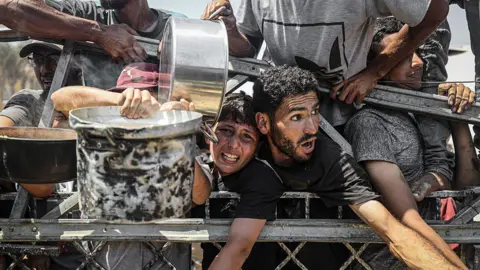 Anadolu via Getty Images
Anadolu via Getty ImagesThree trusted freelance Palestinian journalists whom the BBC relies on for its Gaza coverage have shared how they are now struggling to feed their families and often go two days or more without eating.
All of the men have kept their cameras running, sending us vital footage, even on days when their close relatives have been killed, they have lost their homes, or have been fleeing from Israeli military advances with their families.
One was previously badly wounded by shrapnel from an Israeli bombing while on assignment.
But he says the current time is “the hardest time I have lived through since I was born. It’s a huge crisis of suffering and deprivation.”
Global food security experts have not yet classified the situation in Gaza as a famine, but UN agencies have warned of man-made, mass starvation taking hold.
They have blamed Israel, which controls all supplies entering the Palestinian territory, but it has denied responsibility.

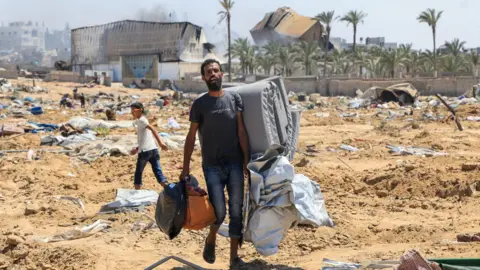 Reuters
ReutersWe have agreed not to identify our colleagues by name out of consideration for their security.
They tell us that not being able to provide for the youngest and most vulnerable of their loved ones is most difficult of all.
“My son who has autism is unaware of what is going on around him. He doesn’t know that we are in a war and he doesn’t speak,” says one of our cameramen in Gaza City, who is a father-of-four.
“In recent days, he’s so hungry that he’s started hitting his stomach with his hand to signal to us that he wants food.”
Our youngest colleague, who is in southern Gaza, is the main breadwinner for his parents and siblings.
“I am constantly wondering how to get food for my family,” he tells us. “My little sister, who’s 13, keeps on asking for food and water and we can’t get any for her. Any water we find will be contaminated.”

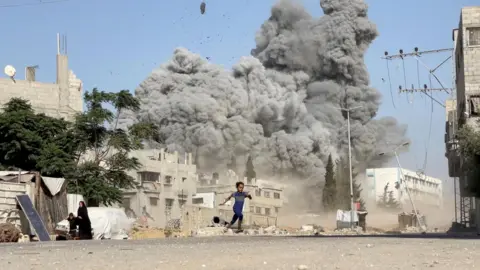 Reuters
ReutersThe BBC has released a joint statement with other media organisations saying it is “desperately concerned” about the wellbeing of local freelance journalists that it works with in Gaza.
“For many months, these independent journalists have been the world’s eyes and ears on the ground in Gaza. They are now facing the same dire circumstances as those they are covering,” says the statement by the BBC and AFP, AP and Reuters news agencies.
The current conditions make telling the story of what is happening even more challenging.
“I feel tired and exhausted all the time, to the point of dizziness and falling to the ground,” says a veteran journalist who now works with us in Gaza City and is looking after his mother, sisters and five children aged two to 16.
He says he has lost 30kg (4st 7lbs) in 21 months of war.
“I used to complete most news reports with great speed, but now I am slow in finishing them due to my poor health and psychological state,” he tells us. “Delirium and fatigue accompanies me.”
“I can’t describe the feeling,” says our southern Gaza cameraman. “My stomach twists in knots, and I have a headache, add to that being emaciated and weak. I used to work from 07:00 until 22:00 but now I can barely do one story. I just feel dizzy.”
Recently, he collapsed during filming but later resumed his work.

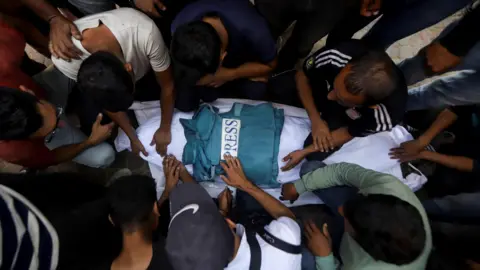 Reuters
ReutersWhile food shortages have been a constant issue during the war, previously those receiving salaries from outside could still buy basic supplies albeit at exorbitant prices on local markets. Now even those markets are largely empty.
“I’ve reached the point of taking food from the charity kitchen. In recent days, this has meant my kids have been eating one meal a day – just limited foodstuffs like lentils, rice and pasta,” says the Gaza City journalist with four small children.
Two of the men say they have taken to drinking water with a little salt to try to suppress their hunger. One says he can sometimes buy a 50g biscuit for his daily meal but this costs 30 shekels ($9; £6.60).
Getting hold of money is an ordeal in itself. It now involves using money merchants.
“If I need cash, it’s mostly not available, but when it is, it’s accompanied by a withdrawal fee of 45%,” explains one Gaza City cameraman. “That means that if I go to withdraw $1,000, I will get only $550. The whole process is exhausting and any vendors nowadays demand cash.”
“The difficulty is because of the closure of the banks. These money transfers are another form of suffering after our hunger,” our colleague in southern Gaza adds.

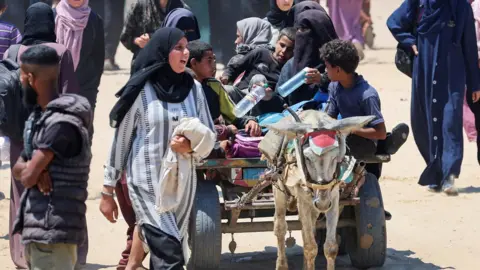 Reuters
ReutersIn the past, Israeli-accredited BBC journalists like myself were able to travel regularly to Gaza to report, even during wartime.
However, since the start of the war on 7 October 2023, Israel along with Egypt – when its Rafah crossing was still open – has prevented foreign journalists from accessing the territory except on limited embeds with the Israeli army.
“We once again urge the Israeli authorities to allow journalists in and out of Gaza,” the BBC and other news organisations said in their statement.
This week, 28 countries including the UK released a joint statement saying: “The war in Gaza must end now.” They called for Israel to comply with its obligations under international law and stop the “drip feeding” of aid.
On Wednesday, more than 100 aid agencies and rights groups stated that “with supplies now totally depleted, humanitarian organisations are witnessing their own colleagues and partners waste away before their eyes.”
The news organisations noted that: “Journalists endure many deprivations and hardships in warzones. We are deeply alarmed that the threat of starvation is now one of them.”
They added: “It is essential that adequate food supplies reach the people [in Gaza].”
For now, our own colleagues are battling to get through each day, balancing their responsibilities to their families with their desire to tell the world about the extraordinary difficulties their people are living through.
“It’s currently catastrophic. Hunger has reached every home,” one told us. “This is like a suspended death sentence.”